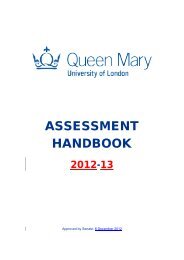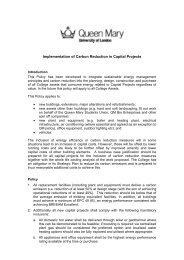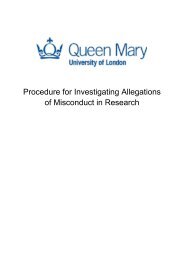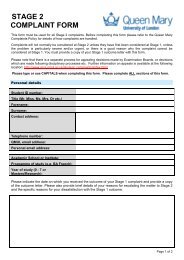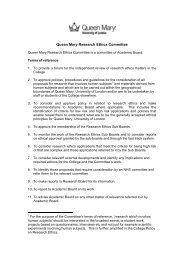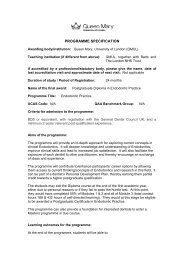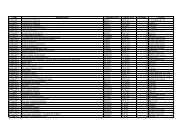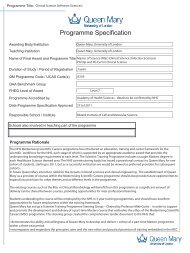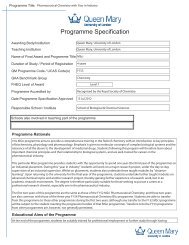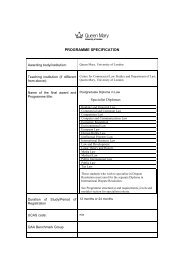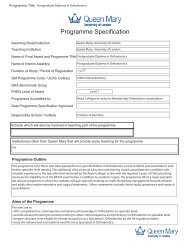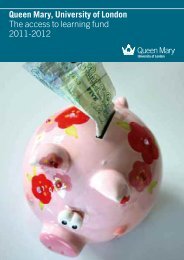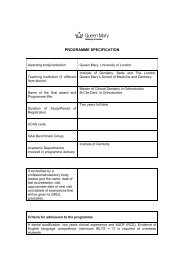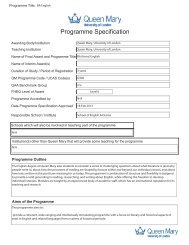Academic Regulations 2010/11 - Academic Registry and Council ...
Academic Regulations 2010/11 - Academic Registry and Council ...
Academic Regulations 2010/11 - Academic Registry and Council ...
Create successful ePaper yourself
Turn your PDF publications into a flip-book with our unique Google optimized e-Paper software.
<strong>Academic</strong> <strong>Regulations</strong> <strong>2010</strong>/<strong>11</strong>Part 1– Framework <strong>and</strong> Governanceii. To consider whether or not, in the sub-board’s judgement, the extenuatingcircumstances are valid <strong>and</strong> whether or not they had a negative impact on thestudents’ performance or participation in assessment.iii. To make recommendations to the Subject Examination Board about actions to betaken in the light of extenuating circumstances.iv. To maintain a record of extenuating circumstances submitted <strong>and</strong> considered, <strong>and</strong>the recommended action.1.39. The membership of the sub-board is agreed by the SEB.Degree Examination Board (DEB)1.40. Degree Examination Boards report to Senate. There are six undergraduate DEBs:Arts, Dentistry, Engineering, Laws, Medicine <strong>and</strong> Sciences <strong>and</strong> four postgraduateDEBs: Arts, Laws, Medicine & Dentistry <strong>and</strong> Sciences.1.41. The terms of reference of Degree Examination Boards are:i. To consider recommendations from Subject Examination Boards <strong>and</strong> to approveawards, classifications <strong>and</strong> fields of study where necessary (pre 2008 cohorts only).ii. To consider <strong>and</strong> approve recommendations from Subject Examination Boards to setaside results which have been affected by accepted extenuating circumstances.iii. To consider recommendations from Subject Examination Boards <strong>and</strong> to approvetermination of registration <strong>and</strong> enrolment of students for academic failure.iv. To exercise discretion where appropriate, <strong>and</strong> within the permitted scope of anyQMUL policy, in order to agree results, progression <strong>and</strong> award.v. To have particular regard to matters of consistency across programmes leading to thesame awards.vi. To resolve differences between <strong>and</strong> within SEBs where they occur.vii. To consider recommendations for the suspension of regulations <strong>and</strong> makerecommendations where appropriate.viii. To consider recommendations for retakes <strong>and</strong> to approve retakes, where appropriate.ix. To ensure the consistent application of the <strong>Academic</strong> <strong>Regulations</strong>.x. To monitor the performance of Subject Examination Boards.xi. To consider other matters referred by Senate.1.42. The membership of Degree Examination Boards is:i. Chair, appointed by Senate or its delegated authorityii. The Chairs of the Subject Examination Boards reporting to the DEBiii. External members, as appropriate, appointed to DEBs by Senate or its delegatedauthority.iv. External Examiners are members where the functions of the SEB <strong>and</strong> DEB arecombined.v. The Vice Principal for Teaching & Learning who may attend any Examination Boardas a member.Page 15 of <strong>11</strong>0



